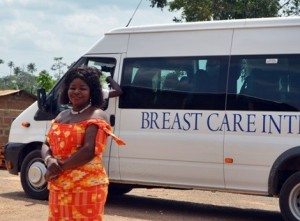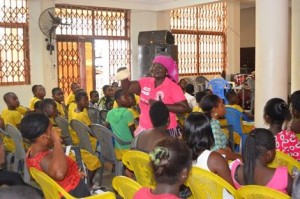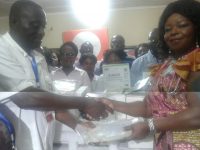 Stigmatization has usually been a problem when efforts are being made to address several diseases such as the menace of breast cancer in Ghana.
Stigmatization has usually been a problem when efforts are being made to address several diseases such as the menace of breast cancer in Ghana.
In Africa, healthcare workers and volunteers have had to dedicate considerable time and attention to educating people to embrace patients who are suffering from these diseases and many others.
Although some levels of success have been achieved in educating the public that Hypertension is Non Communicable Disease like Diabetes and so need no t be stigmatized; the same cannot be said about the cancers, especially breast cancer.
Breast Care International (BCI) – a community based organizations that have dedicated their time to conducting breast screenings, education to create awareness, counselling, advocacy and rehabilitation, in conjunction with the Peace And Love Hospitals (PLHs), have been moving from one town and village to the other to educate our women and help to remove the myths and misconceptions surrounding Breast Cancer and reduce stigmatization.
The women who dread the fear of stigmatization would prefer to live without knowing their status rather than living in perpetual fear and being shunned by the very community they have lived all their lives in.
The canker of stigmatization no doubt even facilitate the death of patients more than the disease itself and this underscores the need to equally direct more attention to fighting it before it becomes too late.
PLH and BCI which have played a lead role in breast cancer awareness creation at the local, national and international levels for over a decade are now directing attention to tackling stigmatization especially in the up country areas.
Breast cancer like many other cancers is claiming the precious lives of Ghanaians although it is curable, and this has become a concern to BCI and PLHs.
Among many urban and rural dwellers, the disease is largely seen as a curse and the nature of advanced cases of breast cancer reinforces such misconceptions among many people.
When at an advanced stage an offensive odour accompanies a discharge from the breast that usually affects the social life of patients.
Research has revealed that breast cancer can be hereditary and because one family would be noted to have incidence of the disease occurring among them the idea of a curse firmly takes root more so because of the premium placed on the supernatural in our part of the world.
The psychological effect on patients who have to live their lives thinking that they are under a curse is very horrible and unimaginable. This has to stop to give patients the opportunity to come out and seek proper diagnosis and treatment.
Like many other social constructs, this curse associated with breast cancer has been a stumbling block in the way of treatment. Patients keep the disease to themselves and stay at home until it is too late.
Breast cancer is curable when detected early, at which time the cost of treatment is also affordable. But when at an advanced stage, treatment options become less and expensive.
Ignorance accounts for stigmatization and it is in this regard that PLH and BCI have incorporated teachings to educate society to accept breast cancer as a mere disease that is curable and preventable.
The President of Breast Care International and the Chief Executive Officer of Peace And Love Hospitals, Dr. (Mrs.) Beatrice Wiafe Addai, at Agona Swedru in the Central Region of Ghana said, it is needless for women who are the majority of breast cancer patients to die from the disease when options are available for treatment. She mentioned this during a Breast Cancer Education and Screening held at The Church of Pentecost in Agona Swedru, Old Sawmill Assembly.
Dr. Mrs. Wiafe Addai challenged the women to regularly practice Breast Self-Examination (BSE) after taking them through the procedure for doing the BSE. The participants were also encouraged to have their breast examined by a trained health professionals at least once annually and all the women above the age of forty (40) are to have their baseline mammogram
She narrated how survivors have played important roles in the awareness creation and education exercises embarked by BCI/PLH. “We do as much as we can to let our people know that our women can and also do survive breast cancer’ she said.
Once the disease is curable, it is inexcusable to fold arms and allow fear and stigmatization to stand in the way of efforts to help women whose contribution to the family, society and economy is very significant.
The two breast cancer survivors shared their stories and advised women that they can also survive the disease if they report early to the hospital.
Madam Rebecca Amoah, a native of Agoana Swedru appealed to Dr. Wiafe to help establish a screening centre at Agona Swedru and also train personnel to enable the people of the town have access to free clinical breast examination.
She also asked the participants to report any abnormalities to the health facility for further investigation and treatment. Five Hundred women including students were clinically screened, Forty Cases were found.
The medical team clinically screened three hundred and nine (309) women for breast diseases, particularly breast cancer. Sixteen (16) suspected cases were referred for further investigations.
The program was initiated by Mr. Kwasi Ackom, a citizen of Agona Swedru.

